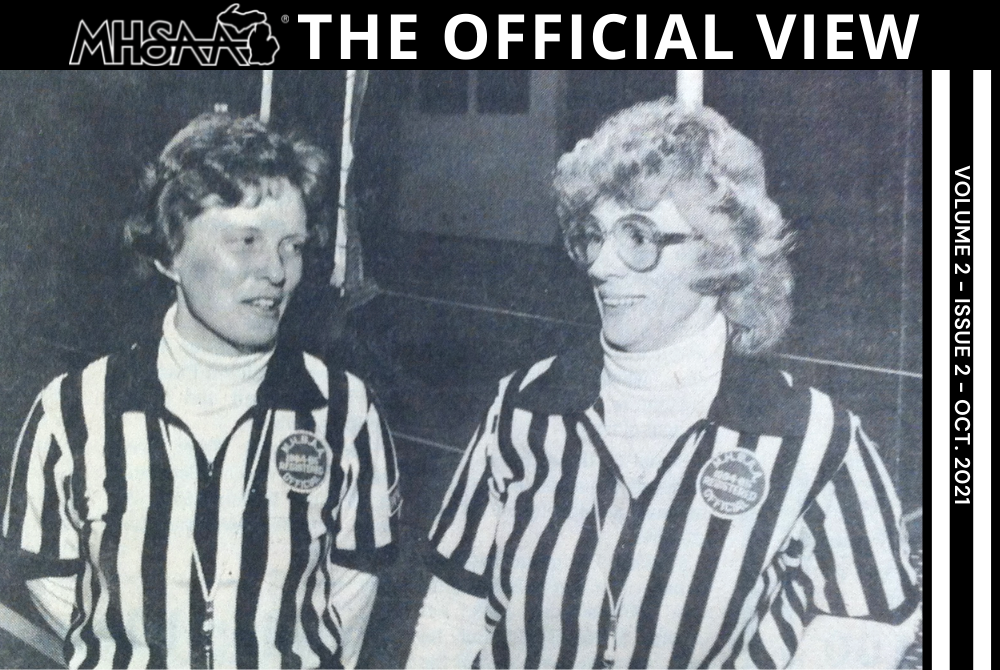
The Official View: Title IX – Door Opens for Female Officials
By
Brent Rice
MHSAA Assistant Director
October 29, 2021
In the 50 years since Congress passed Title IX legislation in order to create equal educational opportunities, huge strides have been made for female students to participate in athletics.
But the advancement of opportunities wasn’t just for the athletes. It also opened a door which ushered in a generation of female sports officials.
Betty Near is one of those officials whose long and distinguished career as a high school and collegiate volleyball official is a direct result of the opportunities provided through Title IX. Unlike many today who entered officiating after having played the sport, Betty didn’t have those opportunities before first climbing the ladder (literally) in 1971. She was encouraged to take up the sport by Macia Tiesenga (a nationally-ranked collegiate official) who told Betty – who had been involved in athletics recreationally – that athletes make the best officials because of their understanding of competition.
“I’m frequently asked whether I got into officiating because I played volleyball. I tell them I didn’t play because girls volleyball didn’t exist when I was in school," Near said. "I try to share the story of Title IX every chance I get, to show them that they now have opportunities to both play and officiate because of those that came before them.”
Near has spent more than 45 years as a registered MHSAA official and is still going strong. That run has included six appearances as a Finals official. She recalls how at one of those Finals, an injury to her knee created a change in mechanics for the entire state.
“When I first began officiating in the 70s, the MHSAA had the umpires (R2s today) kneel underneath the net to look at blockers," she said. "This was quite dangerous and pretty ineffective.
"Officiating at the collegiate level, I had been trained to stand at the pole and look down the net. With this background, and seeing as my knee was still hurting from an earlier injury, I decided to use this mechanic.”
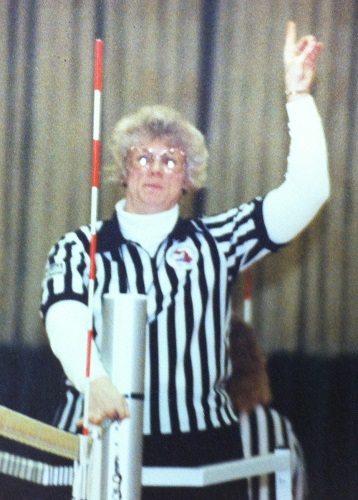 Sue Martin, the MHSAA director for volleyball at the time, approached Betty following her match. Near was certain that she was going to receive an earful. Instead, Martin asked the justification for using the mechanic, and they discussed the pros and cons of each. It was ultimately decided moving forward the umpire would take a position standing at the pole.
Sue Martin, the MHSAA director for volleyball at the time, approached Betty following her match. Near was certain that she was going to receive an earful. Instead, Martin asked the justification for using the mechanic, and they discussed the pros and cons of each. It was ultimately decided moving forward the umpire would take a position standing at the pole.
Mechanics changes aren’t the only effect Near has had on the sport. She was instrumental in the start of the West Michigan Volleyball Officials Association in 1984 and continues to help lead and grow that organization (now with more than 125 members). This has allowed her to work with the community, raising nearly $125,000 for scholarships for graduating high school seniors. And one of her biggest contributions remains her role in recruiting and mentoring new officials – especially helping to develop the next generation of female officials.
“Mentoring is a gratifying thing,” said Near, “especially when I receive emails or calls thanking me for helping them understand specific rules or situations and improving their skill sets. Watching someone I have mentored over 20 years work her way up to officiate multiple state tournaments (pleases me).”
Now officiating primarily at the college level, Betty still reserves Thursdays during the season to officiate MHSAA contests. She does this for the purpose of staying connected to high school students and officials and to build on the growth of female registered officials, though she also recognizes that challenges remain for female officials advancing through the system.
One of the natural barriers that apply to women more often than men is that women who begin families sometimes find difficulties continuing to officiate with their other responsibilities. While home lives can be difficult to navigate (for both women and men), officiating school sports provides a flexible alternative to stay active, remain involved in athletics, give back to the community, develop camaraderie and earn some extra cash.
Another hurdle that Near identifies for female officials, unfortunately, is a continuation of the “good ol' boy network.” She is reminded of a not-so-distant-past example when she and another female official had been selected to officiate the Regional round of the MHSAA Tournament; and even though both were well-established collegiate officials the host athletic director insisted that less-experienced male officials work as the R1 and R2 and the women work as line judges because the men would have better control of the tough matchup.
Of course, that kind of mindset isn’t based in fact, and many of the MHSAA’s best officials in all sports are women. Especially in girls sports, it is important that the student athletes see officials who represent them; but the MHSAA seeks female officials in all sports, including those dominated by male participants. This year will once again include a female officiating in the MHSAA Football Finals. Female officials also have worked Finals in baseball, boys basketball, ice hockey and wrestling.
The door that was opened for women and girls with the passing of Title IX a half-century ago only provides the opportunity. Capitalizing still requires stepping through the door to take full advantage of the opportunities provided. Near wants to encourage anyone to join the avocation of officiating, but especially young women.
“My hook is that the officiating is fun, and it is an activity that can be an avocation that can pay (in many ways) throughout their lifetimes," she said.
It’s Official!
Postseason Assignments: Officials assignments for fall sports tournaments have been released. Congratulations to all selected to officiate this year.
Speaking of tournament assignments, a change will be made this year that allows basketball officials to submit their availability to work together as a crew. Crews can be set for the boys and girls tournaments separately. The hope is that this will encourage more officials to seek postseason consideration, knowing they can choose with whom they will officiate. Eligible individuals not included with a crew will be assigned a crew by MHSAA staff.
For all winter sports officials, make sure to complete all requirements for postseason consideration. Please remember that officials in basketball, competitive cheer, gymnastics, ice hockey and wrestling must opt-in to the tournament by indicating their tournament availability dates HERE. All additional requirements such as completion of tournament exams and submission of regular-season schedule also remain in place.
Officials Review Committee: The Officials Review Committee, consisting of school administrators, officials and assigners from around the state, convened in early October to discuss issues and concerns involving officiating. A number of proposals were made to the MHSAA Representative Council. You can find these and other discussion items by reviewing the minutes HERE.
Know Your Rules
SOCCER A player (#7) is injured and must leave the field. His team elects to play short-handed. If #7 heals up, when can he return to the field? What if they wish to replace him with #12?
RULING If #7 comes back into the game, he only needs to wait until the next stoppage of play. If he will be replaced by #12 though, #12 can enter the game only at the next legal substitution opportunity.
It’s Your Call
REVIEW Last month’s play involved a suspect block by a defensive player (found here). The block by B17 is correctly flagged for an illegal block below the waist. While not widely known by spectators, blocks below the waist (except for linemen immediately at the snap) are illegal for players on both sides of the ball. In this case, since the block was by the defense, the penalty is enforced 15 yards from the end of the run.
VOLLEYBALL Officiating ball handling is the topic of this month’s "It’s Your Call." This rally ends following the pass of a back-row player. What’s the call?
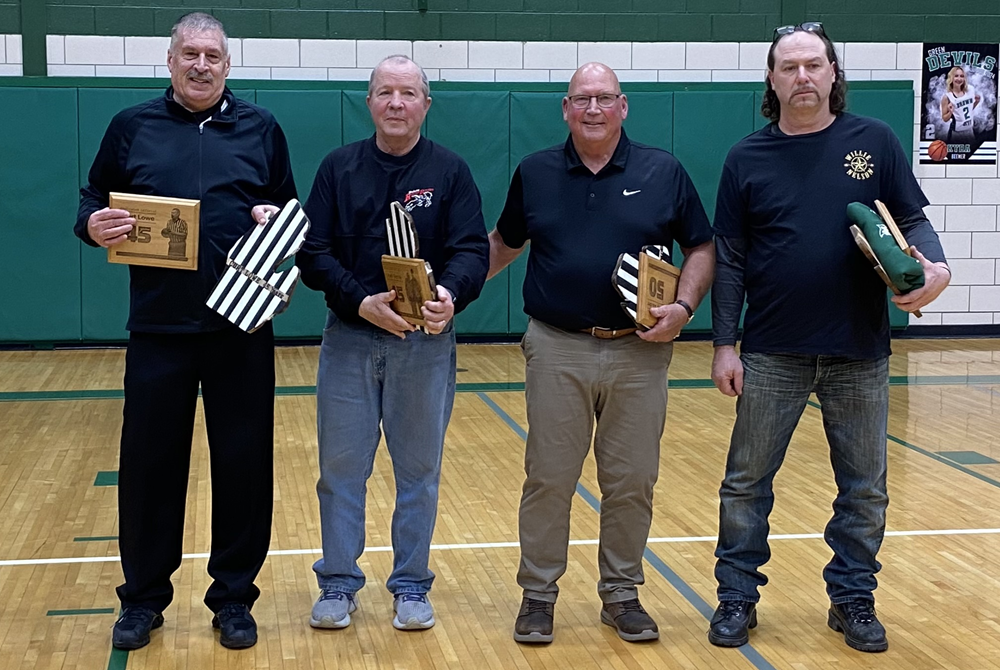
Longtime Officials, Statistician Honored for Decades as 'Behind-the-Scenes' Heroes
By
Paul Costanzo
Special for MHSAA.com
February 23, 2024
BROWN CITY – Jerry Sauder thought he was going to be a presenter Thursday night, as his alma mater Brown City was honoring officials Curt Lowe and Joel Venia and school statistician Todd Vandewarker for their decades of service.
 But that was simply a ruse by fellow official Tom Mailloux and Brown City athletic director Tony Burton to get Sauder there to join the ceremony and receive his own award for 50 years as an official.
But that was simply a ruse by fellow official Tom Mailloux and Brown City athletic director Tony Burton to get Sauder there to join the ceremony and receive his own award for 50 years as an official.
With Sauder on the court, 175 total years of involvement with athletics were honored between the JV and varsity Unionville-Sebewaing vs. Brown City girls basketball games. Sauder spent 50 years as an official, Lowe and Venia 45, and Vandewarker has spent 35 years as a statistician, all across multiple sports.
“Tonight, we gather to pay tribute to those whose steadfast dedication has woven the fabric of excellence into the tapestry of Michigan high school athletics,” Brown City principal Brad Hale said to kick off the ceremony. “It is with profound gratitude that we extend our heartfelt appreciation to the unsung heroes behind the scenes – the pillars whose tireless efforts ensure that each game unfolds seamlessly, each moment etched with the spirit of sportsmanship and fair play. … Tonight, we shine a spotlight on a few whose commitment spans decades, illuminating the path for generations of athletes to follow.”
Sauder’s 50 years as an official included 25 as a Division I college basketball referee. He is currently working in an administrative role with Elite Officiating, overseeing officials in the Michigan Intercollegiate Athletic Association, Great Lakes Intercollegiate Athletic Conference and Wolverine-Hoosier Athletic Conference. He’s officiated NCAA Tournament games and contests around the world after getting noticed at a camp at Western Michigan University.
“I’ve always said I’m the luckiest guy to put on a shirt,” he said. “I was fortunate enough to be selected to be given the opportunity. There’s a lot of guys that could have, but weren’t set up to do it at that time.”
During his time as a high school official, Sauder reffed MHSAA Finals for basketball and football. He also spent time officiating baseball and softball games.
He began officiating when his best friend Jim Seidell, a longtime coach and administrator in Brown City, convinced him to start. Sauder knows his path isn’t a common one, and that it’s not easy to convince people to get into officiating. But with perseverance, opportunities are available.
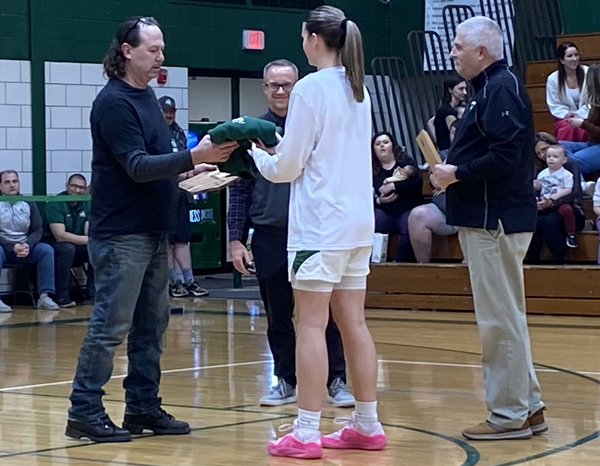 “There’s a dire need right now,” Sauder said. “We’ve got to do something because if we don’t, high school sports as we know it is going to suffer. … I was fortunate to have good people around me that mentored me. Kids start, they last a couple years and they walk away from it. They don’t pay enough money to get yelled at like people go at you now. I don’t blame the young people.”
“There’s a dire need right now,” Sauder said. “We’ve got to do something because if we don’t, high school sports as we know it is going to suffer. … I was fortunate to have good people around me that mentored me. Kids start, they last a couple years and they walk away from it. They don’t pay enough money to get yelled at like people go at you now. I don’t blame the young people.”
Lowe, who officiated Thursday night’s JV game before the ceremony, got his start thanks to Sauder and Seidell. Also a Brown City graduate, Lowe’s 45 years of officiating include multiple assignments at MHSAA Football and Basketball Finals. He’s also been on the court for women’s college basketball games.
“Officiating is like family,” Lowe said. “I have met so many people – wonderful people. And, over 45 years, it’s been a ton.”
While he’s worked plenty of games in the Thumb, much of Lowe’s time as an official was spent in the Saginaw and Flint area, where he was able to officiate games featuring some of the state’s greatest athletes, including Mateen Cleaves, Draymond Green, Mark Ingram and the late Charles Rogers.
“Those were the best games, and Jerry got me in there,” Lowe said. “That was the best ball ever. It was just amazing to watch.”
Lowe’s crew Thursday night included a pair of younger officials who later officiated the varsity game with Mailloux. Lowe thinks it’s a great opportunity for athletes who want to stay connected to sports.
Venia’s start in officiating was more by happenstance. He was working the scoreboard for rec basketball games in his hometown of Marysville, and one day needed to fill in as an official. After reffing the game, he made $10 as opposed to the $5 he got for running the scoreboard, and made the move.
He’s still doing football games but is no longer on the basketball court or softball or baseball diamonds.
“It’s probably the contacts you make in the little towns,” Venia said about what has kept him in the officiating business. “I go down to the Macomb area and do that. In football, we always take five games up in the Thumb. I know so many people up here. With the kids, it keeps you younger, keeps you moving.”
Like Sauder and Lowe, Venia has officiated multiple MHSAA Football and Basketball Finals.
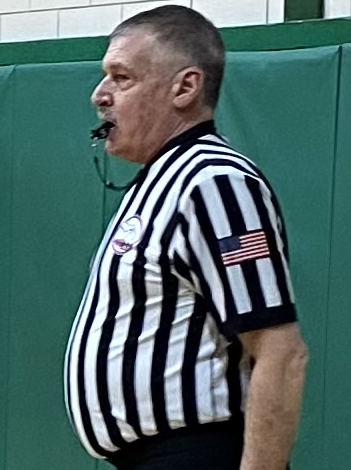 He played football, basketball and baseball in high school, and thinks that experience can be “tremendous” for future officials. But he was quick to point out that those who don’t have that experience can also thrive.
He played football, basketball and baseball in high school, and thinks that experience can be “tremendous” for future officials. But he was quick to point out that those who don’t have that experience can also thrive.
“I’ve worked with a couple guys that never played,” Venia said. “(Mailloux) never played football, but he’s a good football official. I mentored a guy that never played basketball, Jordan Stevens, who is the softball coach at South Dakota State. He never played basketball, never played football, but he was a very good official. I think it gives you an advantage, but by no means is it a barrier if you haven’t played.”
The person with the best seat in the house as Sauder, Lowe and Venia have run up and down the court or football field in Brown City has been Vandewarker, who was celebrated for his decades of service as a statistician.
When asked how he got started, he pointed at Burton.
“That guy suckered me into it,” Vandewarker said with a laugh.
Vandewarker was himself a Brown City athlete, competing in football, basketball and track. Over his more than three decades keeping stats, he’s seen several great Green Devils and opposing athletes – so many that he couldn’t narrow them down.
“A couple thousand (games),” he said. “I’ve seen some stuff, I’ve seen some good stuff. A lot of good players. Too many memorable ones to mention, I guess. I’ve seen the best of the coaches and heard everything they have to say. Best of the refs – I was in high school and Jerry Sauder was reffing my games.”
At that point, Vandewarker had to step away and start the pregame clock for varsity warm-ups. But when he came back, he had an idea of how long he may remain at the center of Brown City athletics.
“I always said as long as Tony and Cindy (Burton, Brown City’s assistant AD) were around,” he said. “But I don’t know. I’ll probably go for another 10-15, put a good 50 in. I think I got that in me, still.”
 Paul Costanzo served as a sportswriter at The Port Huron Times Herald from 2006-15, including three years as lead sportswriter, and prior to that as sports editor at the Hillsdale Daily News from 2005-06. He can be reached at [email protected] with story ideas for Genesee, Lapeer, St. Clair, Sanilac, Huron, Tuscola, Saginaw, Bay, Arenac, Midland and Gladwin counties.
Paul Costanzo served as a sportswriter at The Port Huron Times Herald from 2006-15, including three years as lead sportswriter, and prior to that as sports editor at the Hillsdale Daily News from 2005-06. He can be reached at [email protected] with story ideas for Genesee, Lapeer, St. Clair, Sanilac, Huron, Tuscola, Saginaw, Bay, Arenac, Midland and Gladwin counties.
PHOTOS (Top) From left: MHSAA-registered officials Curt Lowe, Joel Venia and Jerry Sauder and Brown City statistician Todd Vandewarker stand together as they are celebrated Thursday at Brown City. (Middle) Vanderwarker receives his award for 35 years as a school statistician. (Below) Lowe refs the junior varsity game before the recognition ceremony. (Photos by Paul Costanzo.)

